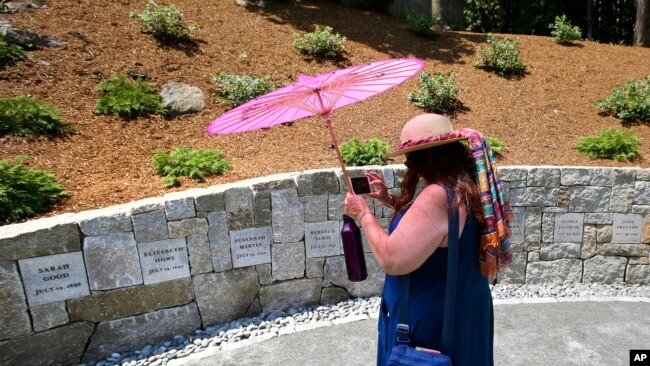魔女狩り冤罪
悲劇です。その悲劇は小説になりそうなほど!!
迷信、恐怖、嫉妬が人を盲目にする、恐ろしいことです。
他者と違うことが受け入れられなかった時代はいつも繰り返される。
でも、” We have a strong voice."!!!と信じたい!!
(私などは、何らかしらの”パワー”が欲しいと思い続けていますが・・・)
VOAで英語を学びましょう!!
ー気に入ったフレーズー
“Elizabeth Johnson Jr. was without a voice, her story lost to the passages of time.” (彼女の物語は時の流れの中で失われてしまった 。)
魔女裁判から300年余、恩赦を受けた女性(和訳)
Woman Pardoned More than 300 Years After Witchcraft Trial
June 11,2022
300年以上の時を経て、マサチューセッツ州セーラムで魔術を使ったとして有罪判決を受けた女性が恩赦を受けました。
魔術とは、伝統的に、しばしば悪霊が関与する超自然的な力を使うことだと説明されることがあります。現代の魔術を別の意味で定義する人もいるかもしれません。
5月26日、マサチューセッツ州議会はエリザベス・ジョンソン・ジュニアの赦免を公式に発表しました。 1693年、ジョンソンは魔女として有罪判決を受け、死刑を宣告されました。彼女の裁判は、マサチューセッツが英国の植民地だった1692年に始まった有名なセーラム魔女裁判の一部でした。
ジョンソンさんは処刑されることはありませんでした。しかし、他の魔女裁判の被告と違って、彼女は公式に恩赦を受けることはありませんでした。
昨年、マサチューセッツ州のある中学校の8年生のクラスが彼女の訴えを取り上げた後、議員たちは彼女のケースを再考することに同意しました。ノース・アンドーバー中学校の生徒たちは、ジョンソンさんの冤罪を晴らすために必要な立法措置について調べました。
担任のキャリー・ラピエール先生は声明の中で、生徒たちが "この冤罪の女性のための正義という、長い間見過ごされてきた問題 "に取り組んだことを賞賛しています。
さらに同教諭は、この法案を通すことで、生徒たちは自分たちではどうすることもできない人を助けることの大切さを示している、と付け加えました。また、この経験は、自分たちには強い声があることを生徒たちに教えることできると言いました。(ここでいう "voice "とは、願いや選択、意見を表明する権利を持つという意味です。)
州議会上院議員のダイアナ・ディゾリオ氏は、この法案を提出し、その後予算案に追加され承認されました。ディゾリオ氏は、「我々は、エリザベスさんのような被害者に起こったことを変えることはできないでしょうが、少なくとも[我々は]記録を正すことはできる。」と述べています。
Witches of Massachusetts Bayと呼ばれるグループは、AP通信に、ジョンソンさんは潔白を証明された最後の告発された魔女ですと話しました。このグループの目的は、同州で行われた”魔女狩り”の歴史と物語を研究し、記録することです。
マサチューセッツ州選出のジョーン・ラブリー上院議員は、「300年間、エリザベス・ジョンソン・ジュニアは声をあげられず、彼女の物語は時の流れの中で失われてしまいました 。」と述べています。
1692年に始まったこの事件では、セーラムや近隣の町から20人が処刑され、その他にも多くの人が魔女として告発されました。歴史家によれば、他人を魔女だと非難した人々には多くの理由がありました。その中には、迷信、病気や他人への恐怖、嫉妬などが含まれていました。
19人が絞首刑にされ、1人が石で押しつぶされて死亡しました。
ジョンソンさんは22歳の時、魔女の告発に巻き込まれました。彼女は裁判にかけられ、絞首刑を宣告されました。しかし、植民地の総督ウィリアム・フィリップス氏は、裁判の不当性が明らかになったため、彼女の処分を取り消しました。
300年以上にわたって、ジョンソンさんの母親を含む多くの容疑者が公式に潔白を証明されました。
しかし、なぜかエリザベス・ジョンソンさんの名前は、記録を訂正するための立法措置に含まれていませんでした。ジョンソンさんには、冤罪を晴らすことができる子供がいなかったのです。
ディゾリオ氏は言います、 「エリザベスさんの物語と闘いは、今日も大きく響いています。」と。「魔女裁判の恐怖から長い道のりを我々は歩んできましたが、今日の女性はまだあまりにも頻繁に自分たちの権利に異議を唱え、懸念を退けています。」と付け加えました。
Woman Pardoned More than 300 Years After Witchcraft Trial
After more than 300 years, a woman who was found guilty of using witchcraft in Salem, Massachusetts has been pardoned.
Witchcraft is traditionally described by some people as using supernatural powers often involving evil spirits. Some people might define modern-day witchcraft differently.
On May 26, Massachusetts state lawmakers officially cleared Elizabeth Johnson Jr. In 1693, Johnson was found guilty of witchcraft and sentenced to death. Her trial was part of the famous Salem Witch Trials which started in 1692 when Massachusetts was a colony of Britain.
Johnson was never executed. But unlike other people who were accused of witchcraft, she was never officially pardoned.
Last year, lawmakers agreed to reconsider her case after an eighth-grade class at a Massachusetts middle school took up her cause. Students at North Andover Middle School researched the legislative steps needed to clear Johnson’s name.
In a statement, their teacher, Carrie LaPierre, praised her students for taking on “the long-overlooked issue of justice for this wrongly convicted woman.”
The teacher added that passing this legislation will show the students the importance of helping someone who cannot help themselves. The experience, she said, also can teach the students that they have a strong voice. (Here, the word “voice” means having the right to express a wish, choice, or opinion.)
State Senator Diana DiZoglio introduced the legislation which was then added to a budget bill and approved. DiZoglio said, “We will never be able to change what happened to victims like Elizabeth but at the very least [we]can set the record straight.”
A group called Witches of Massachusetts Bay told the Associated Press that Johnson is the last accused witch to be cleared. The group’s goal is to study and record the history and stories of the “witch hunts” that took place in that state.
Massachusetts State Senator Joan Lovely said, “For 300 years, Elizabeth Johnson Jr. was without a voice, her story lost to the passages of time.”
Twenty people from Salem and neighboring towns were executed and many others were accused of witchcraft during the incident which began in 1692. Historians say that people who accused others of being witches did so for many reasons. These included superstition, fear of disease and strangers and jealousy.
Nineteen people were hanged, and one man was crushed to death with rocks.
Johnson was 22 when she was caught up in the witchcraft accusations. She was put on trial and sentenced to hang. But the colony’s Governor William Phips threw out her punishment as the injustice of the trials became clear.
Over more than 300 years, many suspects were officially cleared, including Johnson’s mother.
But for some reason, Elizabeth Johnson’s name was not included in the legislative attempts to correct the record. Unlike others who were wrongly accused, Johnson never had children who could have cleared her name.
DiZoglio said, “Elizabeth’s story and struggle continue to greatly resonate today.” She added, “While we’ve come a long way since the horrors of the witch trials, women today still all too often find their rights challenged and concerns dismissed.”
Words in This Story
convict –v. to find someone guilty of a crime
superstition –n. a belief that is based on a fear of the unknown or that certain things bring good or bad luck
jealousy –n. a strong feeling of wanting to have something that belongs to someone else
resonate –v. to have a special meaning or importance for some people
horror –n. an experience or thing that causes great fear or dread
challenge –v. to question whether a person should have or do something
